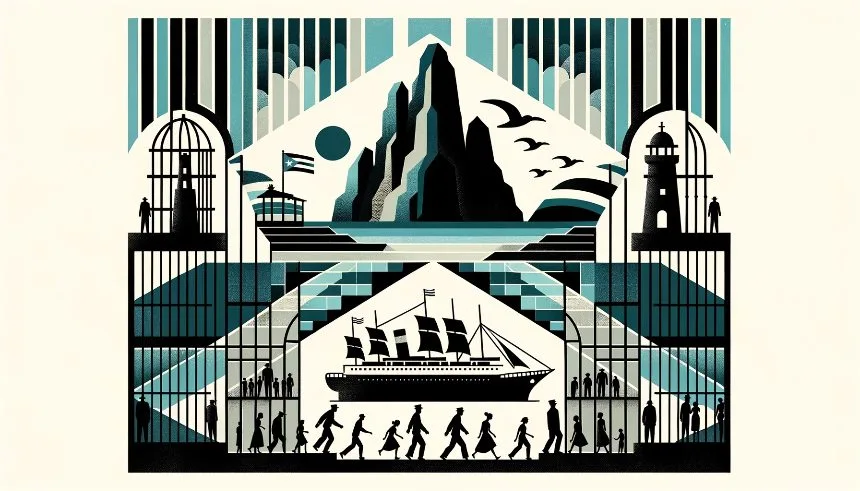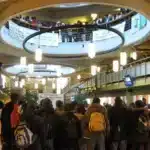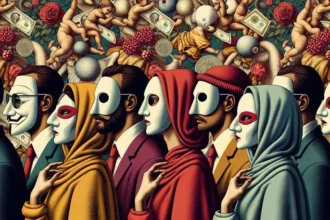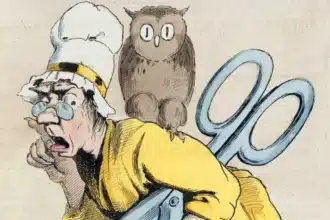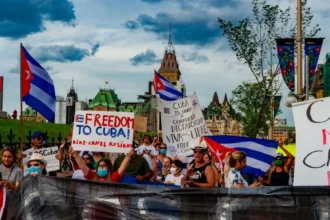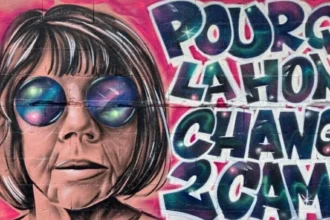For decades, Cuba has witnessed persistent human rights violations, facts that, though widely documented, often took a backseat. However, on July 11, 2021, the scene shifted dramatically. Unlike previous protests, which targeted specific groups such as independent journalists or activists, this day saw an entire nation rise in a unified cry for “freedom.” The chants not only demanded an end to the dictatorship but also voiced a resounding rejection of the communist regime.
These demonstrations challenged all the regime’s prior narratives. Streets were filled with citizens of all ages, social classes, and even various political leanings. It was clear that the diversity and number of protestors debunked any attempts to attribute the protests to external interventions or “mercenaries paid by the CIA.” What was even more surprising was witnessing young people who identified with socialist ideals also joining the voices of protest.
The Regime’s Repressive Tactics
The Cuban government’s response to the July 11th protests was of an unprecedented intensity. Not because it lacked repressive capacity before, but because it had never faced public discontent of such magnitude. The regime’s motto seemed clear: neutralize any individual who might pose a threat.
The Cuban communist regime’s use of forced exile has deep and lasting consequences.
After the brutal repression of the protesters, those who managed to reach their homes might have felt safe, but not for long. An intense witch hunt ensued, generating fear and paranoia. The tactics used to silence dissenting voices boiled down to two main strategies: imprisonment or exile.
It’s estimated that over 1,000 people were detained without prior trial or judicial order, some with sentences of up to 25 years of imprisonment after summary trials. Others, especially those with more influence or visibility, found state security agents stationed at their home doors, restricting their every move for months on end.
From Detentions to Enforced Exiles
But repression was not limited to physical detention. The regime established a stifling environment for those brave enough to criticize it. Threats to family members, public acts of denunciation, internet service interruptions, job dismissals, and warnings of potential reprisals against loved ones became daily life for many. In this hostile setting, prominent figures were presented with exile as a “solution”, a means to escape oppression and ensure their loved ones’ safety.
Camila Cabrera Rodríguez, an activist from the Justice 11J organization, is a prime example. In 2022, after enduring over a year of harassment by State Security, she was forced into exile in Europe. Carolina Barrero, an art historian and human rights advocate, faced a similar situation. She was given a 48-hour ultimatum to leave Cuba, with the threat that, if she didn’t, her fellow activists would be imprisoned. Daniela Rojo, coordinator of the opposition movement Archipiélago, faced an even more dramatic choice. She was offered exile in Germany as an “alternative” to serving a five-year prison term for her peaceful involvement in the 11J protests.
Journalists Katheryn Felipe, Max Barbosa, and Abraham Jiménez Enoa have also fallen victim to this repressive tactic. While their names stand out on the list of forced exiles, sadly, they are not alone. Many others, silently, have been compelled to leave their homes and country for the simple act of speaking out against the Cuban dictatorship.
Barred Returns: The Iron Grip Extends Beyond Borders
The Cuban communist regime’s strategy of forced exile doesn’t merely involve expelling those deemed a threat to their absolute control over public expression. It also encompasses preventing re-entry if the individual in question is traveling abroad. An iconic case is that of Professor Omara Ruiz Urquiola. In 2021, when she attempted to return to Cuba after traveling to the United States for medical treatment, Cuban immigration authorities barred her from boarding the flight. This action was a direct reprisal for her criticisms of both the regime and the quality of the oncological treatment she received in Cuba.
Another case illustrating this repressive approach involves independent journalist Karla Pérez Domínguez. After being expelled in 2017 from the Central University of Las Villas for her activism in the opposition movement Somos+, Karla secured a scholarship in Costa Rica to continue her journalism studies—a career path abruptly halted in Cuba. Upon completing her education and with her student visa expiring, she chose to return to her homeland. However, Cuban authorities denied her entry.
Similarly, art historian and political activist Anamely Ramos faced an unforeseen barrier to her return to Cuba. As she readied herself to board an American Airlines flight in February 2022, the airline notified her of a communication they had received from the Cuban regime, obstructing her return. As a result, she left Miami International Airport shrouded in a haze of uncertainties.
The Cuban government’s trend of using forced exile to silence its critics, whether by directly expelling them from the country or preventing their return, is deeply concerning. This practice, alongside other intimidation tactics employed by the regime daily, demonstrates the constant challenges that human rights activists and independent journalists face in the country.
Emotional and Transnational Repercussions of Exile
This is no minor issue. The Cuban communist regime’s use of forced exile has deep and lasting consequences. It not only induces emotional distress and strains relationships with family and community members, but also results in a loss of civic rights. The stress and uncertainty it breeds can profoundly harm the mental health of the exiles. They are at risk of suffering from depression, loneliness, and social isolation, compounded by the language barriers in their host countries. A significant aspect of this situation is the anguish of their families, faced with the uncertainty of the fate of their children or grandchildren, unsure if they will ever see them again.
The international community bears the responsibility to not only denounce but also act.
As if that wasn’t enough, some face what is known as transnational repression, a tactic whereby governments pursue critics beyond their own borders. The case of Jiménez Enoa serves as a stark example. Not only was he expelled from Cuba for writing about Cuban realities, but he has also been harassed by unidentified men in Europe, including in Madrid and Amsterdam. The Committee to Protect Journalists, which awarded him the International Press Freedom Award in 2020, has called on the Spanish authorities to investigate and ensure his safety.
Cuban communist regime’s strategy of forced exile goes beyond being a mere political manoeuver; it is a deep wound in the soul of the nation. Those forced into exile are not only torn from their homeland and disconnected from their roots, but they also suffer significant anthropological harm at the hands of a regime that seeks not only to silence but also erase any trace of dissent and exert absolute control over freedom of expression.
A Call to the International Community
It is imperative that the world does not view this practice as a mere norm or another characteristic of the Cuban government. Such a practice must be recognized for what it is: a serious violation of human rights and a repression tactic aimed at depriving Cubans of their basic right to live in their homeland.
The international community bears the responsibility to not only denounce but also act. It is essential that diplomatic pressures be applied, and support be provided to those who, now from exile, continue to fight for a free Cuba.


